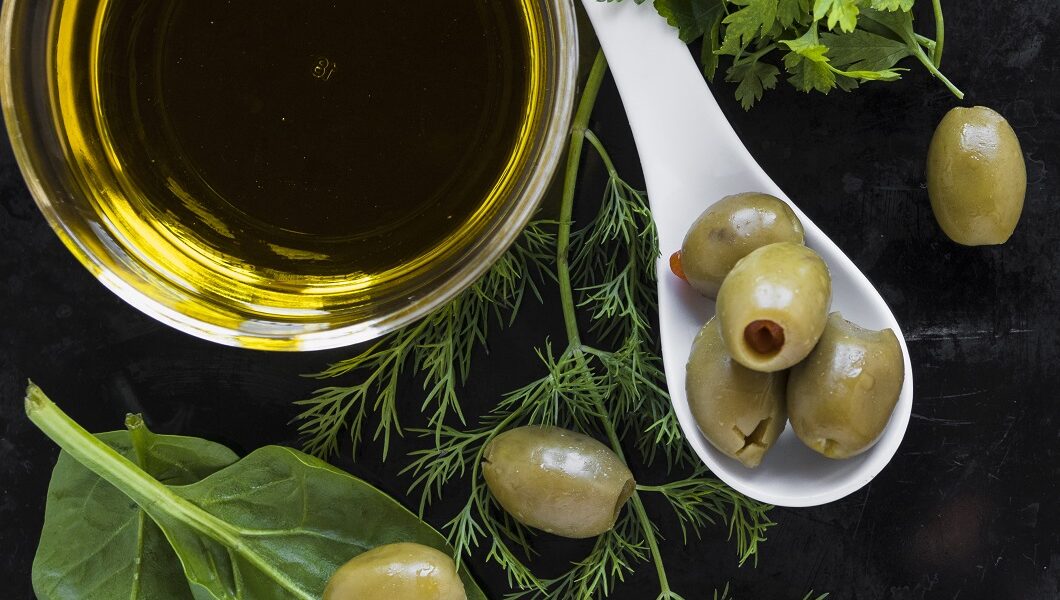What is olive oil and why is it good for your health?
Olive oil is a vegetable oil extracted from olives. It is rich in unsaturated fats, which can be divided into monounsaturated and polyunsaturated fats.
A small percentage contains saturated fats, phytosterols (produced by plants and which are similar to cholesterol), phenolic acids and the substances responsible for its sensorial attributes, so appreciated by us, such as color, odor, taste and aftertaste. The aftertaste is that pleasant and characteristic aftertaste that we can feel even after ingestion.
One of the main reasons why olive oil is beneficial to health is its high concentration of unsaturated fats. What does this mean, anyway? What defines whether a fat is saturated or unsaturated is the structure of its molecule. In other words, how the different chemical elements that make it up are organized. It is precisely the difference in the shape of the molecule that determines the effects they have on our body.
Many studies show that a high intake of saturated fats is related to an increase in LDL cholesterol and the risk of cardiovascular disease. On the other hand, the consumption of unsaturated fats does not affect total cholesterol levels.
Phenolic compounds exert antioxidant, anti-inflammatory and neuroprotective activities. Chemoprotective factors are related to the prevention of malignant cancer, through the use of natural or synthetic products.
What does science say about olive oil?
Several studies evaluate the beneficial effects of olive oil. Check it out!
Effects on metabolic syndrome
First of all, let’s understand what metabolic syndrome means? Metabolic syndrome comprises a series of risk factors for the development of cardiovascular and vascular diseases, as well as diabetes. It is characterized by resistance to the action of insulin, the hormone responsible for controlling the amount of sugar in the blood.
Scientists have shown that extra virgin olive oil can help with weight loss due to its sensory qualities, which increase the acceptability of food and promote satiety. It also acts on glucose metabolism, ensuring optimal blood sugar levels and reducing the risk of diabetes.
It can also reduce the risk of cardiovascular disease and appears to have an effect on controlling blood pressure. Extra virgin olive oil can modify fat metabolism, improving cholesterol and triglyceride levels.
Anticancer effect
Several studies have evaluated its anti-cancer activity. A meta-analysis, which is a statistical study to evaluate several studies on a topic, demonstrated that olive oil reduces the risk of developing cancer, especially breast, gastrointestinal and urinary tract cancer. 9
This effect probably derives from antioxidant properties, that is, the ability of olive oil compounds to limit oxidative stress in our cells and damage to DNA. On the other hand, another study of the same type reports that the data is inconsistent – this means that more investigations are needed to prove its effectiveness against cancer.10
Effects on nervous system diseases
The polyphenols present in olive oil also have a neuroprotective effect. Of particular importance is the reduction of neuroinflammation, a central feature of many neurodegenerative diseases, such as multiple sclerosis, for example. By decreasing inflammation and oxidative stress, polyphenols may slow the progression of these diseases.11
Polyphenols can also prevent strokes. There are several risk factors associated with this disease, and these substances can reduce the risk due to multiple effects, such as anti-inflammatory, antithrombotic, antihypertensive and antioxidant.
Many results, however, derive from animal testing. Therefore, studies in humans are needed to confirm the real beneficial effects.
Effects on the skin
Due to the presence of many bioactive compounds in its composition, scientists evaluate its effects on the skin. Most of the studies carried out to date have used animal models or human cells in vitro.
The results, however, are promising. Several beneficial effects were observed, such as antimicrobial, anti-inflammatory, antioxidant, on aging, skin cancer and the ability to repair wounds.
How to incorporate olive oil into your diet?
Although olive oil has beneficial effects on your health, before incorporating any food into your diet, it is best to consult a nutritionist. Only this professional will be able to provide correct and individualized guidance, indicating a balanced diet that is appropriate for your routine.
Be careful! Some conditions can impair the beneficial effects of olive oil, such as product composition, concentration of components and individual metabolism.
For example, extra-virgin olive oil appears to have more pronounced health benefits than regular olive oil. Regular oil, which is a blend of refined and extra-virgin oil, contains lower amounts of the health-promoting components, as these can be damaged during the refining process.
Furthermore, exposing extra virgin olive oil to high temperatures or long cooking times alters the content of beneficial components.4 Despite this, compared to other oils, extra virgin olive oil is more stable and resistant. In fact, it is the oil that produces the least amount of harmful compounds
when heated.
Remember: olive oil has a high calorie content! 2 According to the main study evaluating the effects of the Mediterranean diet on the prevention of cardiovascular diseases, PREDIMED, it is recommended to consume approximately tablespoons per day – the equivalent of 120 grams. 16 It is worth remembering that these values are for people who adopt the Mediterranean diet.
Below, see some tips on how to use olive oil in your daily meals:
1.on bread, replace margarine or butter with olive oil;
2. roast vegetables and meats drizzled with olive oil;
3.use olive oil to finish dishes;
4.use to season salads, creating homemade sauces.
All these results indicate that regular consumption of olive oil can reduce the risk factors for several diseases . Remember that it should be combined with a nutrient-rich diet. So take advantage of the benefits and magnificent flavor of this oil to try new healthy and tasty recipes.
Conclusion: olive oil is good for health
Olive oil is widely recognized as a cornerstone of a healthy diet, particularly in Mediterranean cuisine. Rich in monounsaturated fats and antioxidants, it contributes to heart health, supports weight management, and may reduce the risk of chronic diseases. Incorporating high-quality extra virgin olive oil into your meals can enhance not only the flavor of your dishes but also your overall well-being. As with any dietary change, moderation is key, and it’s beneficial to pair olive oil with a balanced diet for optimal health benefits.
FAQs
1. What are the health benefits of olive oil?
Olive oil is associated with numerous health benefits, including improved heart health, reduced inflammation, and better brain function. Its antioxidants also help combat oxidative stress.
2. How should I use olive oil in my diet?
You can use olive oil in salad dressings, for sautéing vegetables, drizzling over cooked dishes, or even as a dip for bread. It’s best to use it in its raw form or at lower cooking temperatures to preserve its beneficial properties.
3. Is all olive oil the same?
No, not all olive oils are created equal. Extra virgin olive oil is the highest quality, made from pure, cold-pressed olives, while refined olive oils may have fewer nutrients and flavor compounds.
4. Can olive oil be used for frying?
While olive oil can be used for frying, it’s important to note that it has a lower smoke point compared to some other oils. For frying, it’s best to use light or refined olive oil, but extra virgin is better suited for low-heat cooking and dressings.
5. How much olive oil should I consume daily?
Moderation is key. A common recommendation is about 1 to 2 tablespoons (15-30 ml) per day as part of a balanced diet.
FOR FERDUR INFORMATION:https://proteomics.uk/




